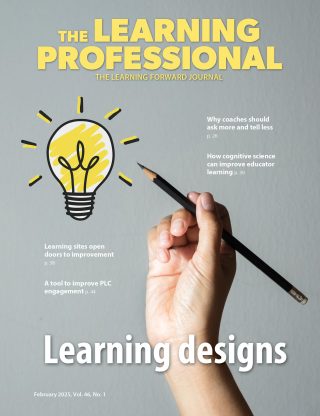FOCUS
Math Makeover
A school-university partnership transforms elementary math instruction
By Nicole Rigelman, Sarah Crane, Kellie Petrick and Donna Shrier
April 2018
Vol. 39 No. 2
Read the remaining content with membership access. Join or log in below to continue.
Sed ut perspiciatis unde omnis iste natus error sit voluptatem accusantium doloremque laudantium, totam rem aperiam, eaque ipsa quae ab illo inventore veritatis et quasi architecto beatae vitae dicta sunt explicabo. Nemo enim ipsam voluptatem quia voluptas sit aspernatur aut odit aut fugit, sed quia consequuntur magni dolores eos qui ratione voluptatem sequi nesciunt. Neque porro quisquam est, qui dolorem ipsum quia dolor sit amet, consectetur, adipisci velit, sed quia non numquam eius modi tempora incidunt ut labore et dolore magnam aliquam quaerat voluptatem.
Jackson Elementary School, Hillsboro, Oregon
Enrollment: 560
Staff: 25
Racial/ethnic mix:
White: 66%
Hispanic: 14%
Multiracial: 9%
Asian: 7%
Black/African-American: 3%
American Indian/Alaska Native: 1%
Limited English proficient: 8%
Free/reduced lunch: 23%
Special education: 13%
Website: www.hsd.k12.or.us/Jackson
References
Fernández, M.L. (2005). Exploring “lesson study” in teacher preparation. In H.L. Chick & J.L. Vincent (Eds.), Proceedings of the 29th Conference of the International Group for the Psychology of Mathematics Education, Vol. 2 (pp. 305-312). Melbourne, Australia: PME.
National Council of Teachers of Mathematics. (2014). Principles to actions: Ensuring mathematical success for all. Reston, VA: NCTM.
Petti, A.D. (2013). Seeking mutual benefit: University and districts as partners in preparation. School-University Partnerships, 6(2), 32-48.
Rigelman, N. (2017). Learning in and from practice with others. In L. West & M. Boston (Eds.), Annual perspectives in mathematics education: Reflective and collaborative processes to improve mathematics teaching (pp. 65-76). Reston, VA: National Council of Teachers of Mathematics.
Rigelman, N.R. (2011). Bring • do • leave: Nurturing reasoning and sense making. Teaching Children Mathematics, 18(3), 190-197.
Rigelman, N.M. & Ruben, B. (2012). Creating foundations for collaboration in schools: Utilizing professional learning communities to support teacher candidate learning and visions of teaching. Teaching and Teacher Education, 28(7), 979-989.
Stein, M.K., Smith, M.S., Henningsen, M.A., & Silver, E.A. (2009). Implementing standards-based mathematics instruction: A casebook for professional development (2nd ed.). New York, NY: Teachers College Press.
Teitel, L. (2003). The professional development schools handbook: Starting, sustaining, and assessing partnerships that improve student learning. Thousand Oaks, CA: Corwin Press.
Watanabe, T. (2002). Learning from Japanese lesson study. Educational Leadership, 59(6), 36-39.
Weaver, D., Dick, T., & Rigelman, N.R. (2005). Assessing the quantity and quality of student discourse in mathematics classrooms. Paper presented at Math Science Partnership Evaluation Summit, Minneapolis, MN. Available at https://hub.mspnet.org/index.cfm/12626.
Recent Issues
BUILDING BRIDGES
December 2024
Students benefit when educators bridge the continuum of professional...
CURRICULUM-BASED PROFESSIONAL LEARNING
October 2024
High-quality curriculum requires skilled educators to put it into...
LEARNING TO PIVOT
August 2024
Sometimes new information and situations call for major change. This issue...
GLOBAL PERSPECTIVES
June 2024
What does professional learning look like around the world? This issue...












